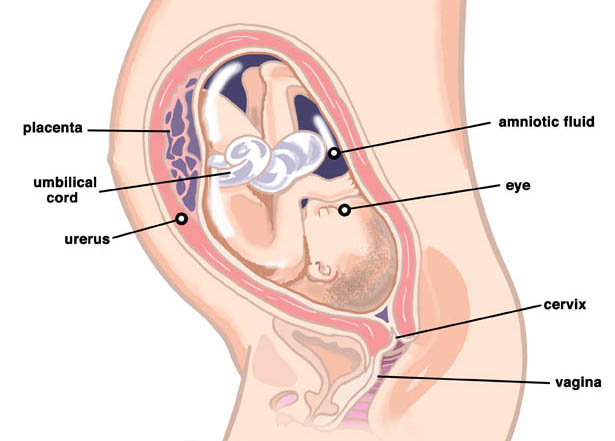30 Weeks Pregnant
Related Articles
External Links
- This article has no external links.
Your baby at 30 weeks
Now about 43cm in length and possibly over 1.3kg in weight, your baby is growing quickly. Your baby's brain is beginning to develop quickly now, and it closely resembles that of an adult brain. It is quite wrinkled in appearance and this is because extra brain tissue will grow as your baby matures and learns more in the outside world. The brain is also able to start taking on some tasks previously seen to by other means. For example, it is now able to regulate the baby's body temperature, which is why the lanugo (the downy hair covering the baby's body) is falling out. Facially, your baby's unique features are developing quickly and he or she now has eyebrows and eyelashes which they are already practicing to flutter!

How you are feeling
You will find that as the baby gains weight, there will be less space in your uterus for them to move about in. This means that the strength of their kicks and punches will lessen, and the movement you feel will begin to feel more like nudges and pokes. Unfortunately though, this does not necessarily make for a more comfortable experience. As your pregnancy progresses and your uterus rises, you will probably start to feel these jabs in your ribs. Additionally, you may find that the baby can wriggle itself into positions that put extra pressure on your bladder. This is all part of the joy of carrying your little one and not something that you can avoid. If the baby is causing you discomfort, it is quite likely to move if you change your position. Maybe lie down or change the way that you are sitting or standing. You may notice a pattern to the baby's movements, which in part can be down to their own developing routine of waking and sleeping, but also due to your own routines in movement. Many women report that the baby is most active just as they go to bed at night. While this may seem like a worrying sign of things to come, the reason that the baby moves so much then is likely to be due to the increase in space available in your uterus once you are lying on your side with your legs away from your body. You may also have noticed that you find the baby's level of movement changes after you have had sex. If the baby seems to have gone very still after you have made love then this is probably due to the rocking motion having lulled them to sleep. If, on the other hand, you find that they seem more lively than ever after sex then that is also normal; the motion from sex and the subsequent uterine contractions that follow orgasm may have woken them! Unless you have been advised otherwise by your GP or midwife, sex during pregnancy is perfectly safe and something that your baby is totally unaware of.
What you need to do
By now you have probably been asked to confirm your intentions as to where you plan to have your baby, but it is not too late to change your mind if you have needed more time to consider your options. Most women chose to have their babies in a hospital maternity unit or a birth centre. A maternity unit will have more medical resources and usually access to special care if needed; a birth centre tends to be run by midwives and has less technology and fewer medical resources. However, many women prefer to deliver in a midwife-run unit as they are often perceived to offer a more calm and relaxing environment. There are a number of major hospitals with maternity units that have a birth centre on site. This offers the best of both worlds in that additional medical help is available quickly if needed. A small, but growing, number of women are choosing to have their delivery at home. Talk to your midwife if this is something that interests you. Remember that generally birth centre and home deliveries are only advised in low risk pregnancies.
| << 29 Weeks Pregnant | 31 Weeks Pregnant >> |